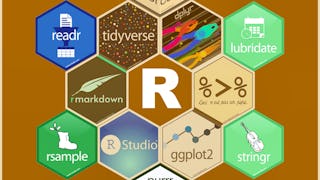This course continues our gentle introduction to programming in R designed for 3 types of learners. It will be right for you, if:



Data Analysis with Tidyverse
This course is part of Expressway to Data Science: R Programming and Tidyverse Specialization

Instructor: Jane Wall
1,500 already enrolled
Included with 
(12 reviews)
Recommended experience
What you'll learn
You will learn to identify and describe tidy data and transform a non-tidy data set to be tidy in R.
You will learn to analyze data between multiple related data tables.
You will be learn to apply regular expressions to detect patterns in strings and return matches and replace patterns with new values.
Skills you'll gain
Details to know

Add to your LinkedIn profile
8 assignments
See how employees at top companies are mastering in-demand skills

Build your subject-matter expertise
- Learn new concepts from industry experts
- Gain a foundational understanding of a subject or tool
- Develop job-relevant skills with hands-on projects
- Earn a shareable career certificate

There are 5 modules in this course
When analyzing data, you will often be required to import data from CSV or txt files. In this module, you will learn how to import and parse data in base R and the readr library, a package in the Tidyverse. You will also be introduced to R projects, which help store and organize data files associated with an analysis.
What's included
7 videos2 assignments4 plugins
Data are stored in tabular forms and are often organized differently depending on its use. In this module, you will learn how to reorganize data to produce a "tidy" data set, where every variable is stored in its own column, every observation is stored in its own row, and each value is stored in a table cell.
What's included
6 videos1 reading1 assignment1 peer review2 ungraded labs1 plugin
Data analysis rarely involves a single data table and you will be required to combine multiple related tables to answer questions you are interested in. In this module, you will learn and practice mutating variables and filtering observations from relational data.
What's included
4 videos1 reading1 assignment1 peer review1 ungraded lab2 plugins
This module will introduce string manipulation in R. You will learn the basics of strings, including string creation, merging, and subsetting. Then, you will use regular expressions to describe and view patterns in strings.
What's included
11 videos1 reading3 assignments1 peer review2 ungraded labs2 plugins
In the last module of the course, you will use the forcats package in the tidyverse to work with categorical variables, variables that have discrete values. The forcats package introduces factors - data objects used to categorize the data in levels. You will practice creating and modifying factors.
What's included
6 videos2 readings1 assignment1 peer review1 ungraded lab3 plugins
Earn a career certificate
Add this credential to your LinkedIn profile, resume, or CV. Share it on social media and in your performance review.
Prepare for a degree
Taking this course by University of Colorado Boulder may provide you with a preview of the topics, materials and instructors in a related degree program which can help you decide if the topic or university is right for you.
Instructor

Offered by
Explore more from Data Analysis


University of Colorado Boulder


University of Colorado Boulder


Johns Hopkins University


Johns Hopkins University
Why people choose Coursera for their career




New to Data Analysis? Start here.

Open new doors with Coursera Plus
Unlimited access to 10,000+ world-class courses, hands-on projects, and job-ready certificate programs - all included in your subscription
Advance your career with an online degree
Earn a degree from world-class universities - 100% online
Join over 3,400 global companies that choose Coursera for Business
Upskill your employees to excel in the digital economy
Frequently asked questions
Access to lectures and assignments depends on your type of enrollment. If you take a course in audit mode, you will be able to see most course materials for free. To access graded assignments and to earn a Certificate, you will need to purchase the Certificate experience, during or after your audit. If you don't see the audit option:
The course may not offer an audit option. You can try a Free Trial instead, or apply for Financial Aid.
The course may offer 'Full Course, No Certificate' instead. This option lets you see all course materials, submit required assessments, and get a final grade. This also means that you will not be able to purchase a Certificate experience.
When you enroll in the course, you get access to all of the courses in the Specialization, and you earn a certificate when you complete the work. Your electronic Certificate will be added to your Accomplishments page - from there, you can print your Certificate or add it to your LinkedIn profile. If you only want to read and view the course content, you can audit the course for free.
If you subscribed, you get a 7-day free trial during which you can cancel at no penalty. After that, we don’t give refunds, but you can cancel your subscription at any time. See our full refund policy.
More questions
Financial aid available,


